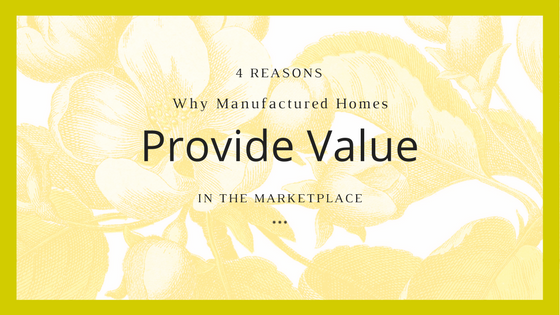4 Reasons Why Manufactured Homes Provide Housing Value in the Marketplace
February 16, 2017

Some people claim that manufactured homes aren’t a good alternative to conventional home ownership. The primary culprit seems to be the fact that these homes depreciate in time.
Quite surprisingly, increasing numbers of investors are viewing factory-built housing as a lucrative investment opportunity. On the downside, failing to identify the key drivers of value in different sectors of the manufactured housing industry, including manufacturing, retail and lending sectors, can significantly limit investment performance.
To go beyond theory, let’s look at four ways manufactured housing can provide value in the marketplace.
Versatility
Thanks to evolving design, engineering and site guidelines, today’s manufactured homes can be built to meet various style, function, performance, safety and energy-efficiency requirements, which are similar to those that apply to conventional structures.
Not only do modern manufactured homes adhere to stringent federal regulations under the HUD program; they can also comply with any local design standards, which means they can fit in with different neighborhoods and communities. As a result, new factory-built homes are currently subject to fewer restrictive zoning regulations than several years ago. Additionally, the literature review supports the theory that a factory-built home that has a conventional look and integrates seamlessly into a neighborhood will appreciate better over time.
Price
Recent research has shown that the major difference between site-built and factory-built housing isn’t appearance or quality of construction but price. Manufactured housing officials confirm that manufactured homes can save buyers a minimum of 20 percent over conventional construction.
Since the national HUD Code regulates all aspects of construction, performance, transportability, energy efficiency and fire resistance, manufacturers have been able to define consistent industry standards so that the manufactured homes can fit the conditions of different states. This has made it possible for manufacturers to develop mass-production specifications and techniques, which allows for hefty savings across the entire value chain.
Manufactured Home Classification
A great aspect about manufactured homes is that they can be purchased with either personal property loans or conventional mortgages. To be financed with a conventional mortgage, a manufactured home must be permanently affixed to foundation and classified as real estate.
In that case, the loan will be heavily regulated by various state and federal laws. This is beneficial to both borrowers and lenders. While borrowers will be protected by consumer protection laws and benefit from certain homeownership tax breaks, lenders will be entitled to relevant foreclosures and repossessions that don’t apply to personal property loans.
Land as an Appreciating Asset
The Consumers Unions found that manufactured homes appreciate at the same rate as site-built structures when they’re placed on land owned by residents. Given that land is in limited supply and the population is projected to increase, land values will most likely rise over time. Therefore, the land underneath a manufactured home can play a major role in home appreciation, particularly when the demand for a certain area grows.
But location isn’t the only factor that affects the value of a manufactured home. The degree of appreciation is specific to each property, depending on the amenities included, market value, maintenance, inflation rates and other variables that also impact the appreciation rate of conventional construction.
No matter what industry opponents say, manufactured homes provide an affordable, eco-friendly solution to a myriad of housing problems we’re facing nowadays. If you’re looking for a reliable and reputable partner who can walk your through the ins and outs of this industry, please call our expert staff at (800)-522-2013, Ext. 1287.
